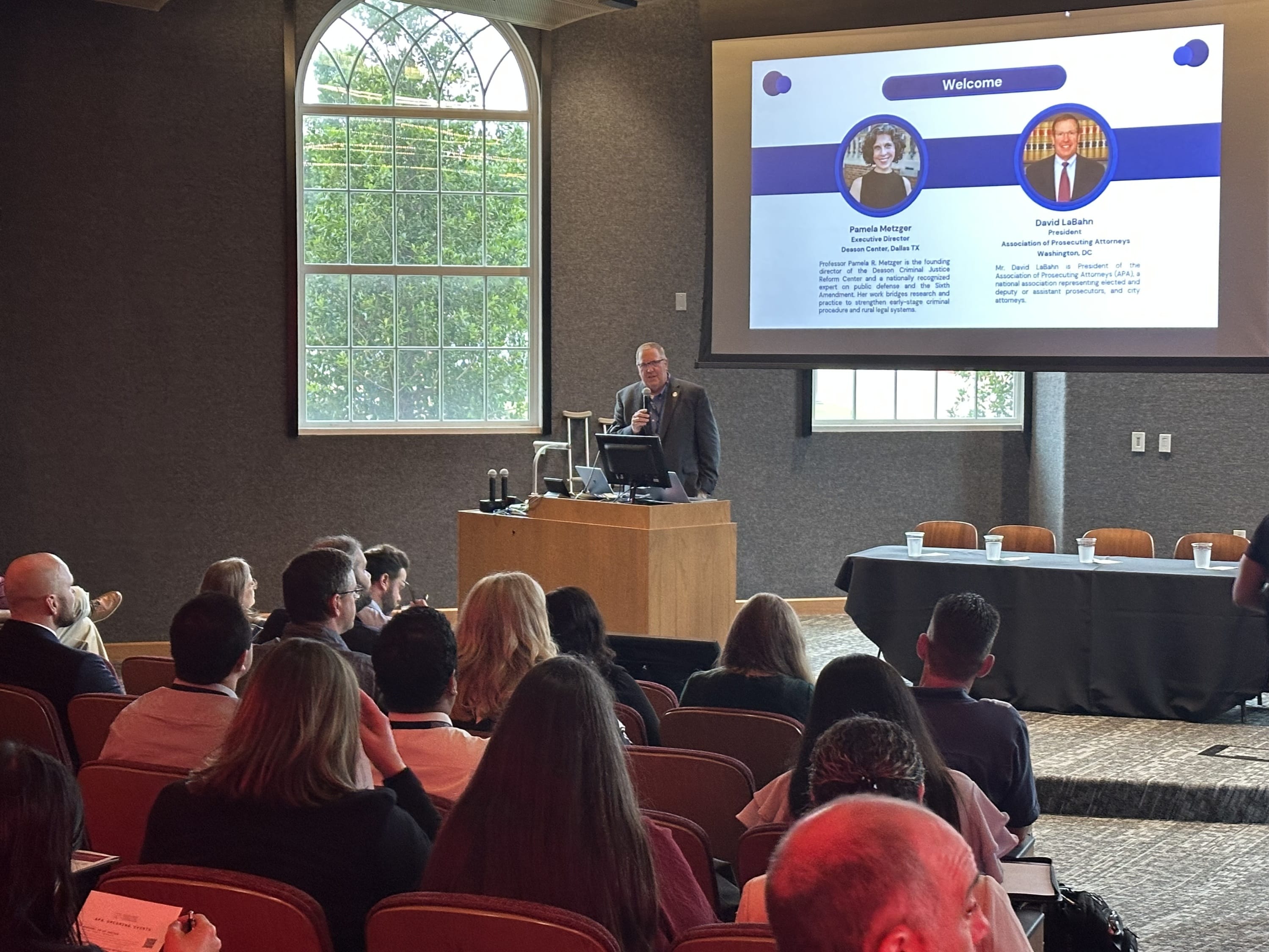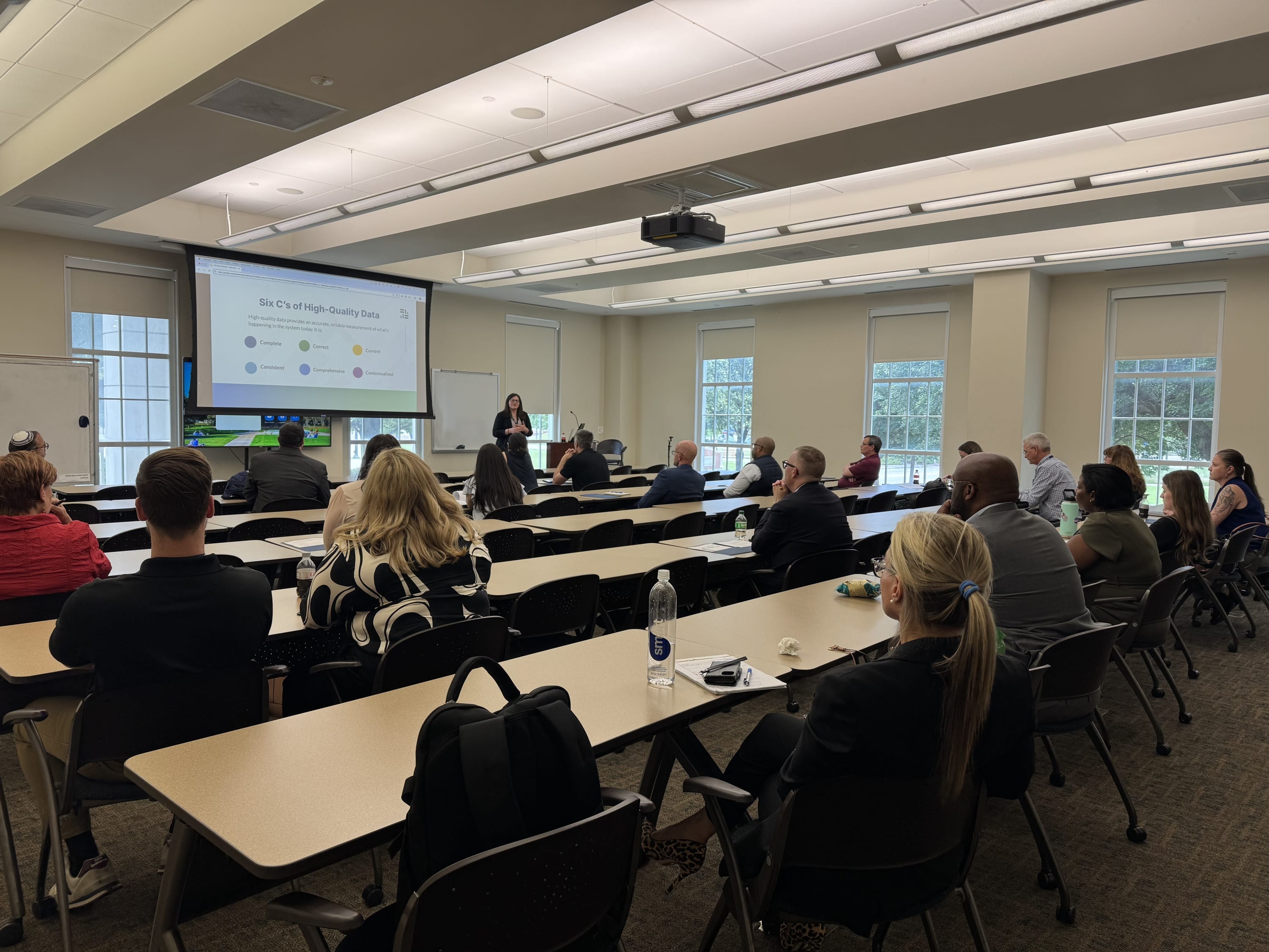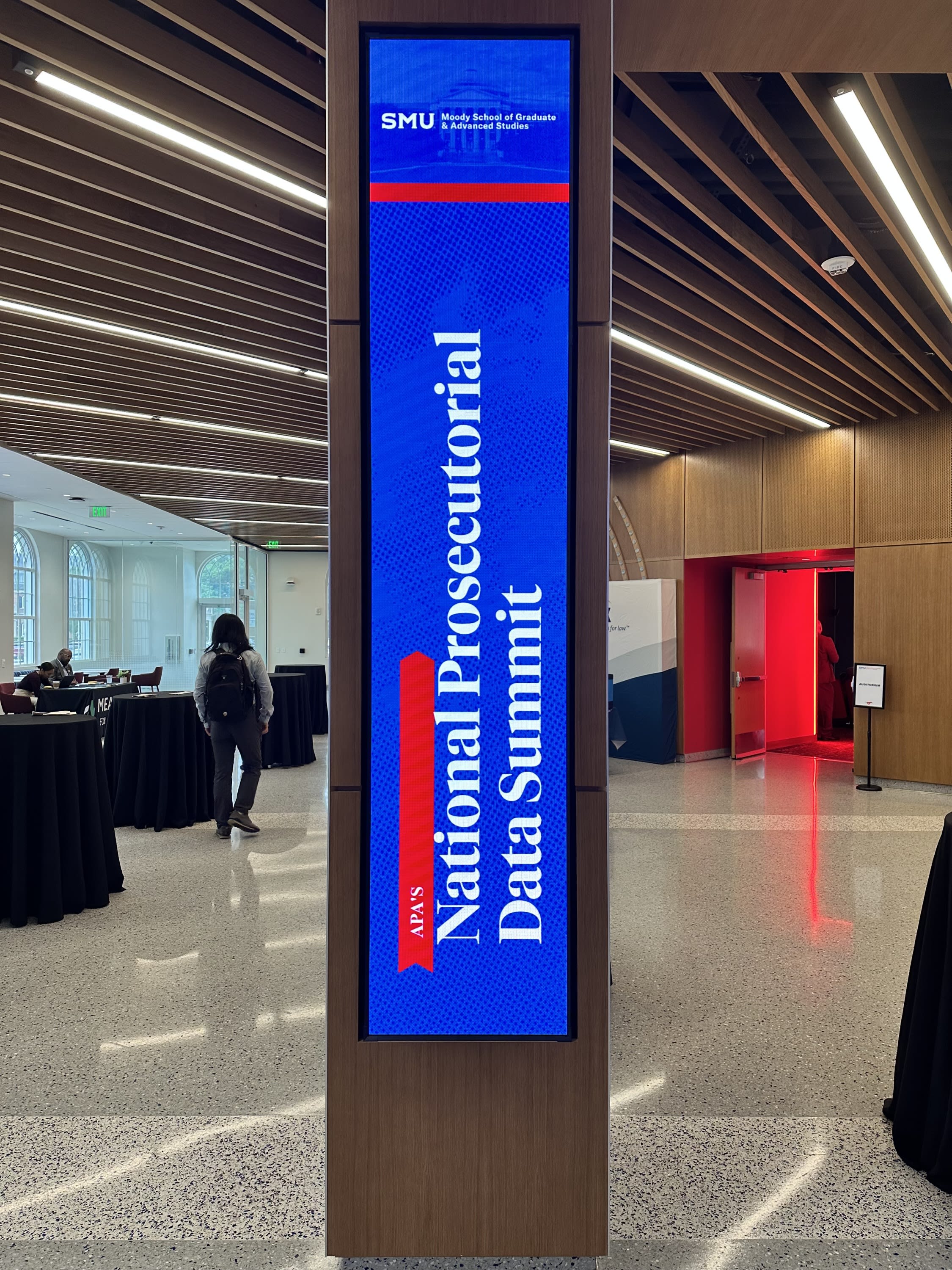
Reflecting on the 3rd Annual National Prosecutorial Data Summit
Harnessing Data and Technology to Shape the Future of Prosecution
On June 5-6, over 140 prosecutors, researchers, data analysts, and justice system leaders gathered in Dallas, TX for the 3rd Annual National Prosecutorial Data Summit. Hosted by the Association of Prosecuting Attorneys (APA) in partnership with the Deason Center at SMU Dedman School of Law and the Dallas County District Attorney’s Office, the two-day event offered a dynamic space to explore how data and technology are reshaping the future of prosecution.
Day 1: Elevating Justice Through Evidence and Innovation
The Summit opened with welcome remarks from leaders across the justice and tech sectors, followed by a keynote address from the Honorable John Creuzot, on the transformative potential of data and technology in advancing justice.

The morning sessions focused on the innovative use of causal research in prosecutorial decision-making. Experts shared how randomized controlled trials and rigorous data analysis are helping offices evaluate the real-world impact of policies—from diversion programs to sentencing recommendations. The presentation introduced prosecutors to the power of causal research—using rigorous, evidence based methods to determine what works in criminal justice policy and practice—putting data to work! The session was moderated by Dr. Neel Sukhatme, JD, Associate Dean for Research and Academic Programs, Georgetown University School of Law and the information was presented by Pamela Metzger, Executive Director, Deason Center, Dallas, TX, Ellyce Lindberg, Chief, Grand Jury and Intake Division, Dallas County District Attorney’s Office, Dallas, TX, and Dr. Andrew L.B. Davies, Research Director, Deason Center, Dallas, TX.
Later, attendees explored the art of data storytelling, learning how to craft compelling narratives using data that drive internal strategy and public engagement. Data storytelling, if used correctly, can create a dynamic and persuasive picture. Brenden DuPont, Deputy Director of Analytics, Loyola University Chicago, Chicago, Il and Chanterelle Sung, Director of Policy Initiatives, Queens District Attorney’s Office, Queens, NY, presented on techniques to craft compelling narratives, visualize data for impact, and engage internal and external stakeholders to turn raw data into persuasive story telling that drive decision making.
The afternoon featured breakout sessions on:
Data literacy for attorneys, especially mid-level managers. Attendees heard from Christopher Handley, Director of Operations & Chief of Innovation, Harris County District Attorney’s Office, Houston, TX, Wayne Graham, Senior Deputy Prosecuting Attorney, Thurston County Prosecuting Attorney’s Office, Olympia, WA, and Brad Berry, Karpel Foundation.
Cross-agency data integration to improve coordination across the justice system. Attendees heard from Dr. Sema Taheri, Vice President of Research, Measures for Justice, Rochester, NY on steps needed to integrate data, and Stephen Talpins, Chief Assistant State Attorney, Miami-Dade County State Attorney’s Office on their office success in integrating cross-agency data.
Saving money and time with better data storage and management strategies. Robert Beiser, from Microsoft and Eillie Coludro, Assistant District Attorney, Mecklenburg County, NC, discussed considerations for prosecutors in making technology investments and optimizing those investments.
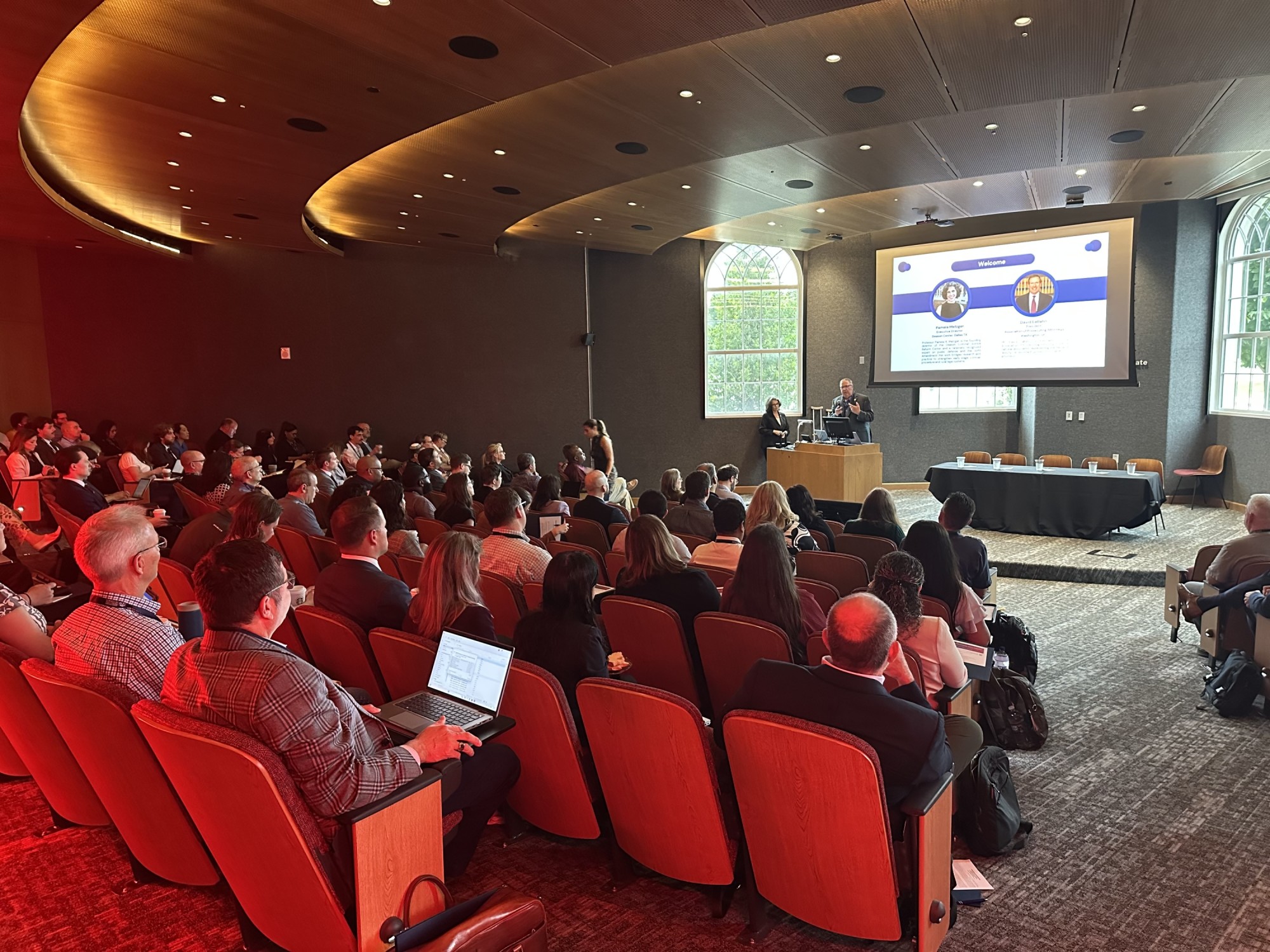
The morning sessions focused on the innovative use of causal research in prosecutorial decision-making. Experts shared how randomized controlled trials and rigorous data analysis are helping offices evaluate the real-world impact of policies—from diversion programs to sentencing recommendations. The presentation introduced prosecutors to the power of causal research—using rigorous, evidence based methods to determine what works in criminal justice policy and practice—putting data to work! The session was moderated by Dr. Neel Sukhatme, JD, Associate Dean for Research and Academic Programs, Georgetown University School of Law and the information was presented by Pamela Metzger, Executive Director, Deason Center, Dallas, TX, Ellyce Lindberg, Chief, Grand Jury and Intake Division, Dallas County District Attorney’s Office, Dallas, TX, and Dr. Andrew L.B. Davies, Research Director, Deason Center, Dallas, TX.
Later, attendees explored the art of data storytelling, learning how to craft compelling narratives using data that drive internal strategy and public engagement. Data storytelling, if used correctly, can create a dynamic and persuasive picture. Brenden DuPont, Deputy Director of Analytics, Loyola University Chicago, Chicago, Il and Chanterelle Sung, Director of Policy Initiatives, Queens District Attorney’s Office, Queens, NY, presented on techniques to craft compelling narratives, visualize data for impact, and engage internal and external stakeholders to turn raw data into persuasive story telling that drive decision making.
The afternoon featured breakout sessions on:
Data literacy for attorneys, especially mid-level managers. Attendees heard from Christopher Handley, Director of Operations & Chief of Innovation, Harris County District Attorney’s Office, Houston, TX, Wayne Graham, Senior Deputy Prosecuting Attorney, Thurston County Prosecuting Attorney’s Office, Olympia, WA, and Brad Berry, Karpel Foundation.
Cross-agency data integration to improve coordination across the justice system. Attendees heard from Dr. Sema Taheri, Vice President of Research, Measures for Justice, Rochester, NY on steps needed to integrate data, and Stephen Talpins, Chief Assistant State Attorney, Miami-Dade County State Attorney’s Office on their office success in integrating cross-agency data.
Saving money and time with better data storage and management strategies. Robert Beiser, from Microsoft and Eillie Coludro, Assistant District Attorney, Mecklenburg County, NC, discussed considerations for prosecutors in making technology investments and optimizing those investments.
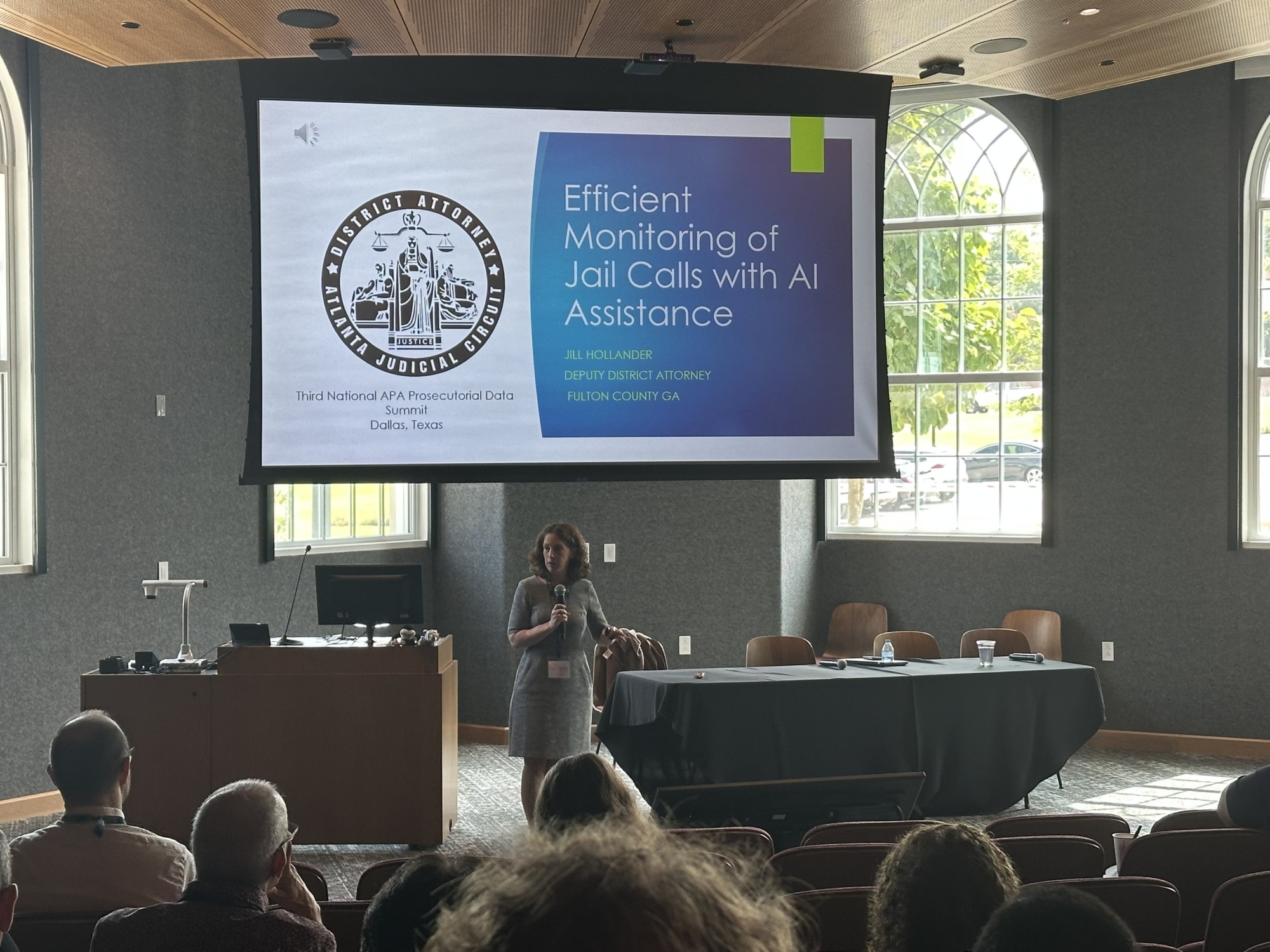
Next, attendees examined how data and intelligence tools are being used to enhance community safety, including predictive analytics and real-time crime centers. Lt. Miguel Holguin, New Jersey State Police, and Jill Hollander, Assistant District Attorney, Fulton County District Attorney’s Office, Atlanta, GA, presented their innovative uses of technology and data in creating safer communities. Attendees especially enjoyed Jill detailing her innovative use of AI and technology to monitor jail calls in an efficient and effective manner!
The Summit closed with a powerful session by Professor Sonia Gipson Rankin, New Mexico School of Law, on the ethical use of data and technology in prosecution. The discussion emphasized the need for transparency, accountability, and safeguards against bias and misuse. Professor Rankin challenged legal professionals to adopt a forward-thinking yet cautious approach to AI and data use in the justice system. Her expertise, clarity, and commitment to ethical integrity left a lasting impression on all who attended.
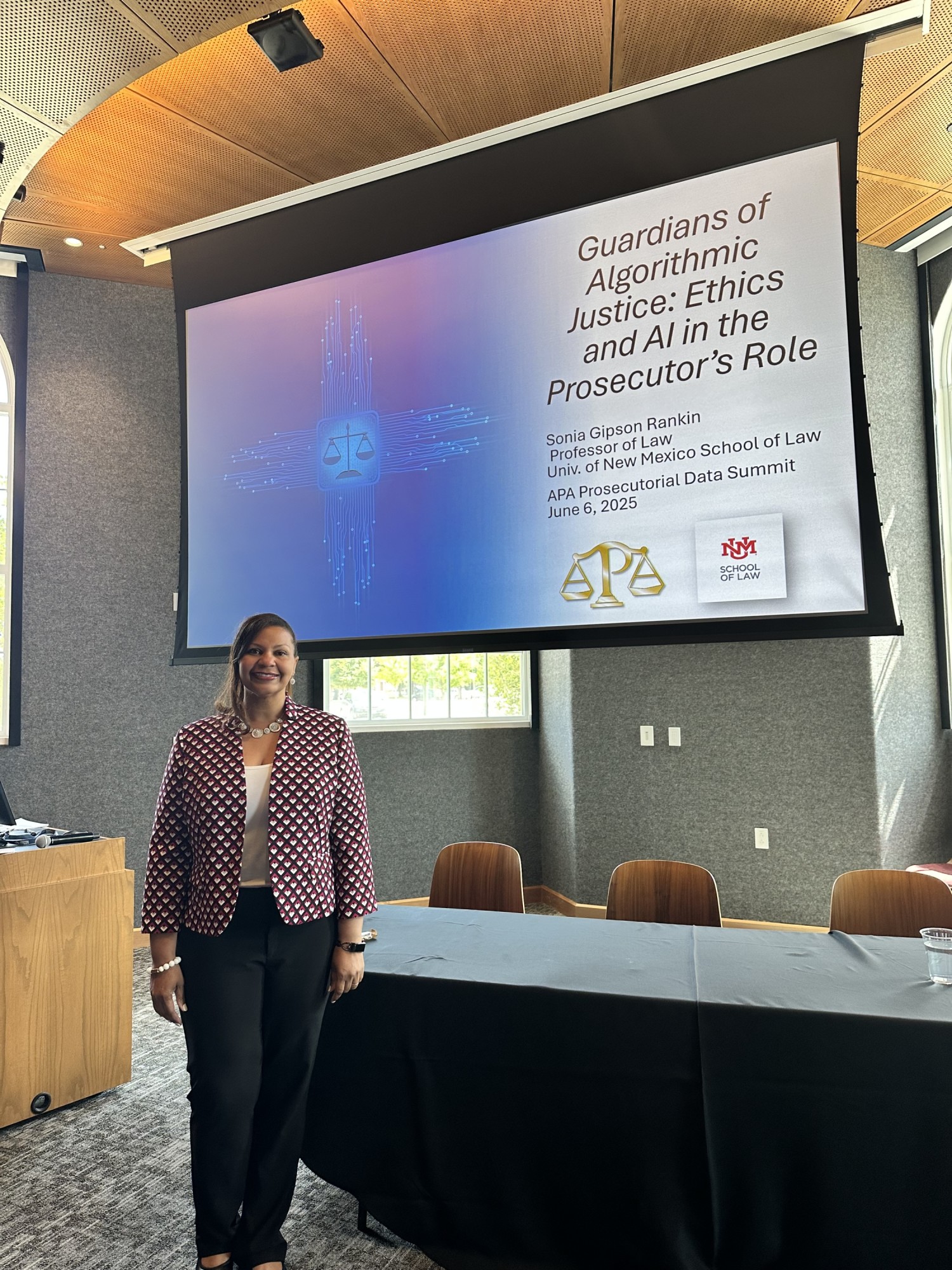
Looking Ahead
The 2025 Data Summit underscored a shared commitment to using data not just as a tool—but as a catalyst for smarter, fairer, and more efficient prosecution. From AI to ethics, from storytelling to system integration, the conversations in Dallas reflected a field that is evolving with purpose.
We’re grateful to all who attended, presented, and supported this year’s Summit. A special thank you to Microsoft and Arnold Ventures for their generous support, as well as our sponsors Axon, NICE, Matrix, Prosecutor by Karpel, and Measures for Justice.
Stay tuned for post-event resources and updates—and we look forward to seeing you at next year’s gathering!
If you are interested in learning more about the Data Summit and how your office can get involved in future efforts, please email marlene.biener@apainc.org or annmarie.taggart@apainc.org.
Keywords: Prosecutorial innovation, data-driven prosecution, prosecutorial decision-making, criminal justice data, AI in prosecution, ethical data use, evidence-based policy, legal data storytelling, cross-agency integration, public safety analytics, prosecution technology, APA, Association of Prosecuting Attorneys, Deason Center, SMU Dedman School of Law, Dallas County District Attorney.
Images



